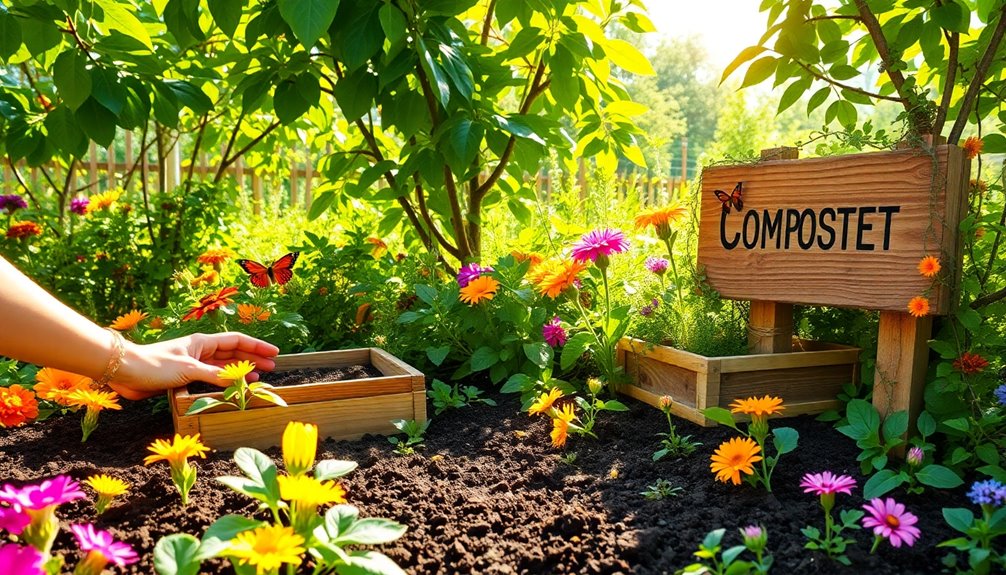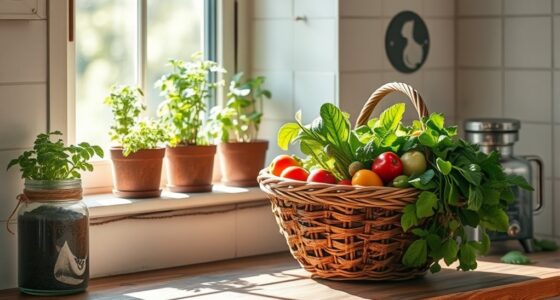To garden sustainably, start by choosing native plants that thrive in your local climate with less water. Implement water-saving techniques like drip irrigation and mulch to conserve moisture. Embrace organic practices by using natural fertilizers and practicing crop rotation to maintain soil health. Attract beneficial insects to manage pests naturally. Lastly, reduce plastic use by opting for biodegradable materials. Stick with us, and you'll uncover more tips to enhance your sustainable gardening journey.
Key Takeaways
- Choose native plants that thrive in your local climate, requiring less water and supporting local wildlife.
- Implement water-saving techniques, such as drip irrigation and mulch, to conserve moisture and reduce evaporation.
- Utilize organic gardening practices, including natural fertilizers and crop rotation, to maintain soil health and encourage beneficial insects.
- Compost kitchen scraps and yard waste to improve soil fertility and structure while reducing waste.
- Minimize plastic use by opting for biodegradable pots and natural materials for garden maintenance.
Choosing Native Plants for Your Garden

When considering what to plant in your garden, have you thought about the benefits of using native plants?
These plants are well-adapted to your local climate and soil conditions, which means they require less water and fewer resources to thrive. By choosing native species, you'll create a habitat that supports local wildlife, including birds, butterflies, and beneficial insects.
Native plants thrive in your local climate, needing less water and resources while supporting essential wildlife.
This enhances biodiversity and helps maintain the ecosystem in your area. Native plants also reduce the need for pesticides and fertilizers, promoting a healthier garden.
Plus, their natural beauty can give your space a unique charm. So, when you're planning your garden, consider incorporating native plants for a sustainable and vibrant landscape that benefits both you and the environment.
Implementing Water-Saving Techniques
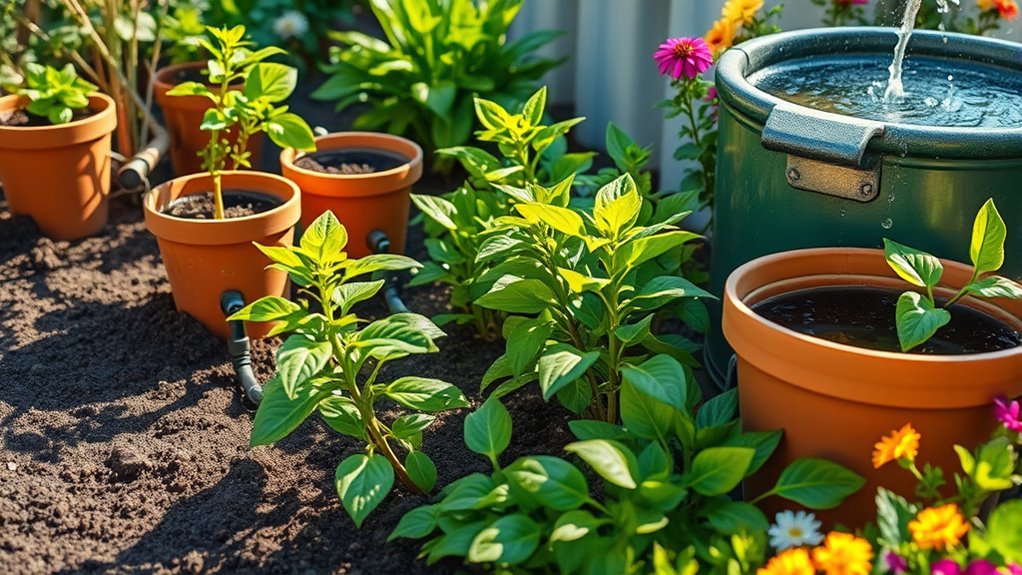
Although water is essential for a thriving garden, implementing water-saving techniques can help you conserve this precious resource while still nurturing your plants.
Start by using drip irrigation systems, which deliver water directly to plant roots, minimizing evaporation. Consider mulching your garden beds; it retains moisture and suppresses weeds.
Water your plants early in the morning or late in the evening to reduce evaporation losses. You can also collect rainwater in barrels to use for irrigation.
Group plants with similar water needs together, allowing you to water more efficiently. Finally, check your soil's moisture regularly, so you only water when necessary.
Utilizing Organic Gardening Practices
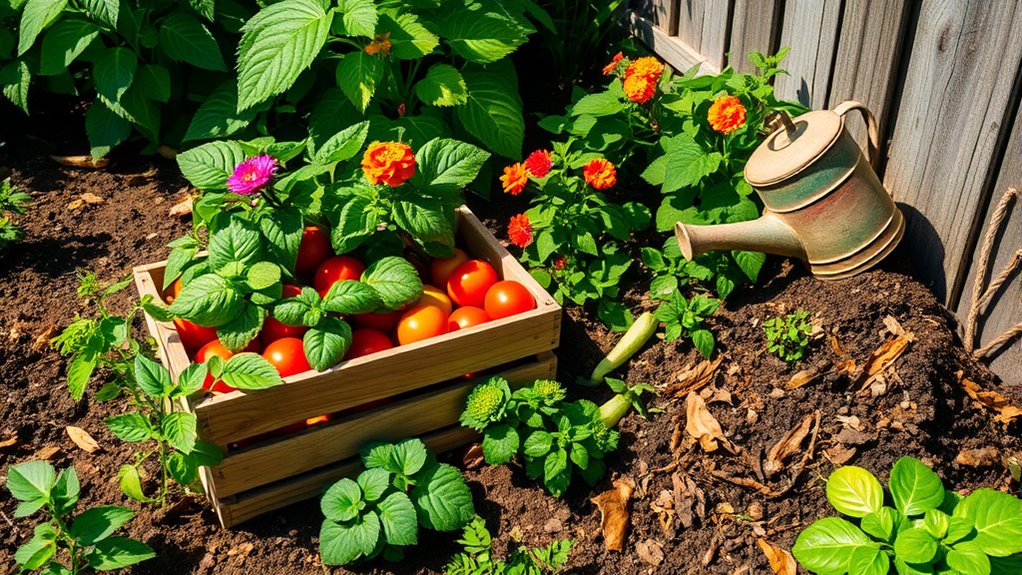
Implementing water-saving techniques not only conserves resources but also sets the stage for a thriving organic garden.
To make the most of your organic gardening efforts, focus on using natural fertilizers, such as compost or well-rotted manure. These enrich the soil without harmful chemicals.
Choose native plants that require less water and are adapted to your local climate. You can also practice crop rotation to maintain soil health and prevent pests.
By encouraging beneficial insects, like ladybugs, you can naturally manage pests without pesticides.
Mulching helps retain moisture and suppress weeds, further supporting your organic approach.
Remember, the key is to create a balanced ecosystem where plants, soil, and wildlife work harmoniously together.
Enjoy the journey to sustainable gardening!
Composting for Soil Health

Composting not only enriches your soil but also reduces waste, making it a cornerstone of sustainable gardening.
To start composting, gather kitchen scraps like fruit peels, vegetable trimmings, and coffee grounds. Combine these with yard waste such as grass clippings, leaves, and small branches.
Turn your pile regularly to aerate it and speed up decomposition. Keep a balance between green materials (nitrogen-rich) and brown materials (carbon-rich) for optimal results.
In a few months, you'll have nutrient-rich compost ready to amend your garden beds. Use this compost to improve soil structure, water retention, and overall fertility.
Attracting Beneficial Insects
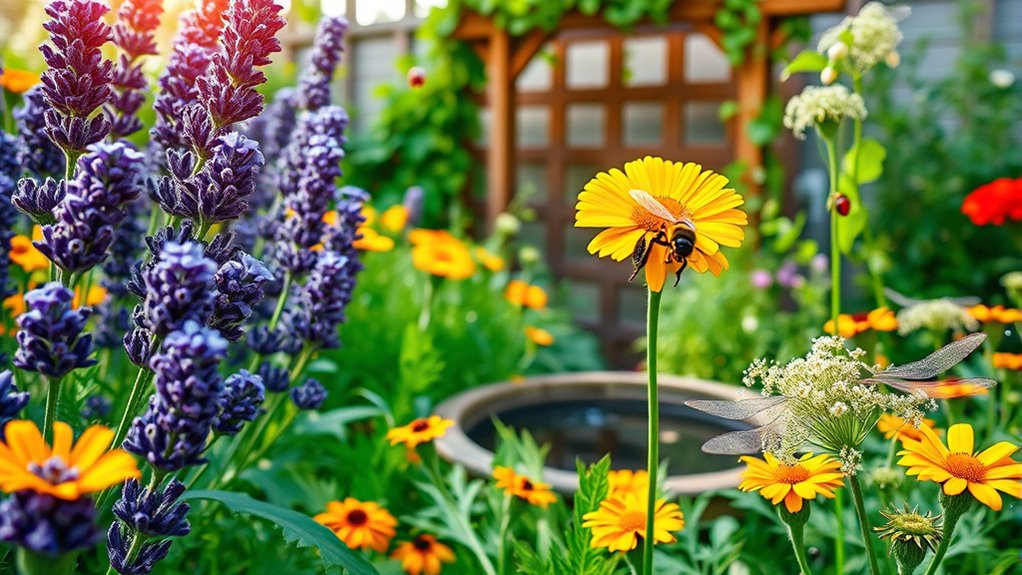
Healthy soil not only supports plant growth but also creates an inviting environment for beneficial insects.
To attract these helpful allies, start by planting a variety of flowers and herbs. Species like marigolds, dill, and fennel can draw in beneficial insects such as ladybugs and lacewings.
Avoid using pesticides; instead, embrace natural pest control methods. You might also consider creating habitats like insect hotels or leaving small areas of bare ground for ground-nesting insects.
Providing water sources, like shallow dishes filled with pebbles, can further entice them.
Practicing Crop Rotation
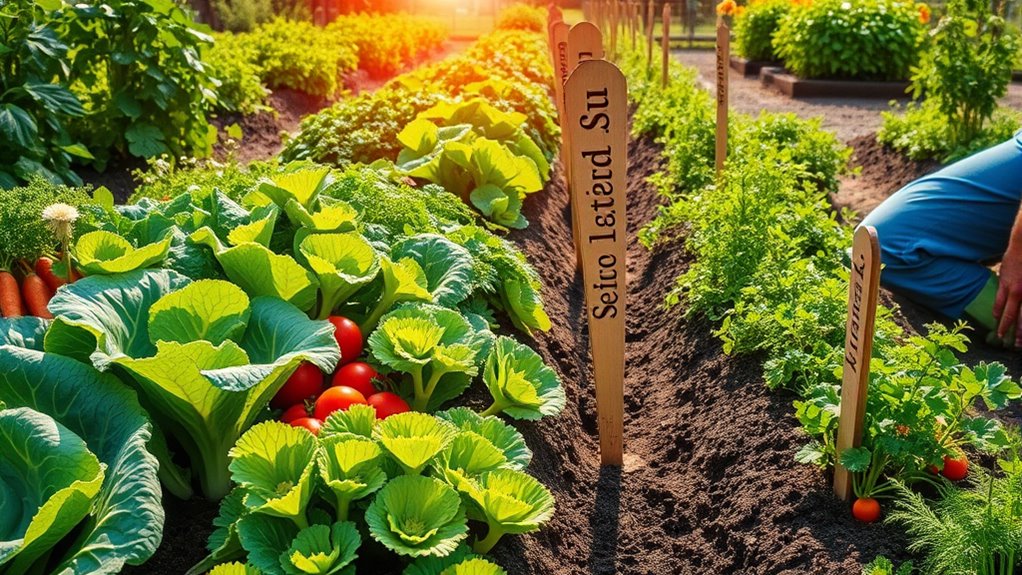
While you might be tempted to plant the same crops in the same spots year after year, practicing crop rotation can significantly enhance your garden's sustainability.
By changing the location of your crops, you reduce soil nutrient depletion and disrupt pest and disease cycles. For example, follow legumes with nitrogen-loving plants, like tomatoes or peppers, to boost soil fertility naturally.
Plan your garden layout in advance, grouping similar families together and rotating them annually. This practice not only keeps your soil healthy but also increases biodiversity, which can lead to a more resilient ecosystem.
Reducing Plastic Use in Gardening
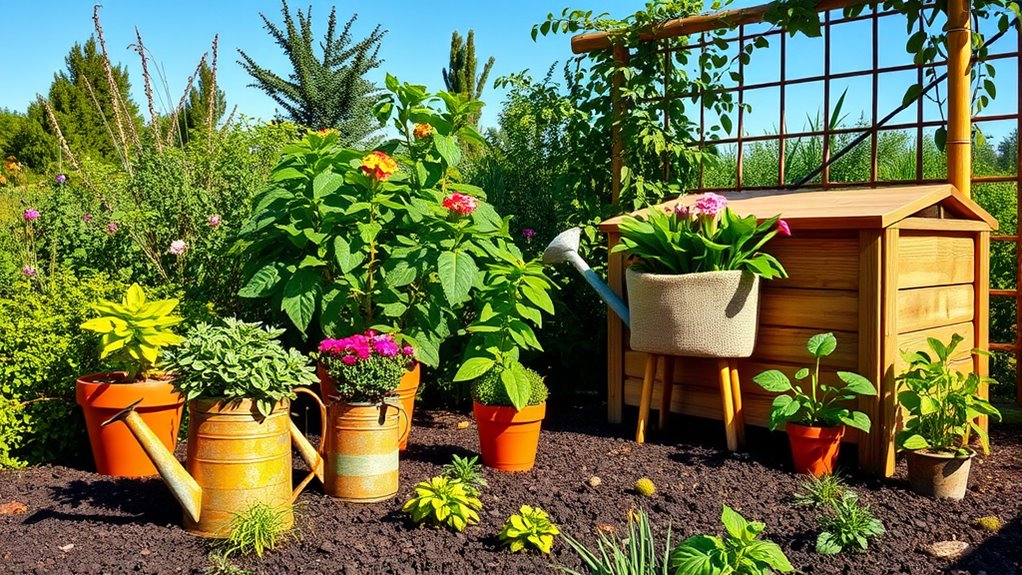
As you cultivate your garden, consider how reducing plastic use can enhance its sustainability and overall health.
Start by swapping plastic pots for biodegradable alternatives like terracotta or metal. These materials not only decompose but also improve soil health over time.
Instead of plastic plant markers, use wooden stakes or stones to label your plants. For mulch, opt for natural materials like straw or wood chips instead of plastic sheeting.
When watering, invest in a drip irrigation system made from recycled materials to minimize waste.
Lastly, compost your kitchen scraps and yard waste in a biodegradable bin, steering clear of plastic bags.
Frequently Asked Questions
How Can I Start a Community Garden for Sustainability?
To start a community garden for sustainability, you'll want to gather interested neighbors and discuss your goals.
Find a suitable location with enough sunlight and access to water. Together, create a plan for what to grow, ensuring it's diverse and eco-friendly.
Organize resources, like seeds and tools, and set a regular schedule for maintenance.
What Are the Benefits of Vertical Gardening?
Vertical gardening offers a striking contrast to traditional gardening.
You're not just saving space; you're creating a stunning visual impact. By growing upwards, you maximize your harvest while minimizing land use.
It also improves air circulation and sunlight exposure for your plants, leading to better growth. Plus, it can reduce pest issues and make maintenance easier.
How Do I Choose the Right Gardening Tools?
Choosing the right gardening tools starts with assessing your needs.
Think about the types of plants you'll grow and the tasks you'll tackle. For smaller gardens, a trowel, pruning shears, and a hand rake might suffice.
If you're planning a larger space, consider investing in a shovel, hoe, and wheelbarrow.
Don't forget to choose tools that feel comfortable in your hands, as this makes gardening more enjoyable and efficient.
What Is Companion Planting and How Does It Work?
You might think companion planting is just another gardening fad, but it's a proven method that boosts plant health.
Essentially, it involves growing different plants close together to enhance growth and deter pests. For instance, planting tomatoes with basil can improve flavor and ward off harmful insects.
By strategically pairing plants, you create a more balanced ecosystem, leading to healthier crops and less reliance on chemical pesticides.
It's a simple yet effective technique!
How Can Gardening Benefit Mental Health and Well-Being?
Gardening can significantly boost your mental health and well-being. When you dig in the soil, plant seeds, and watch them grow, you're engaging in a therapeutic process.
It reduces stress, increases your mood, and fosters a sense of accomplishment. Spending time outdoors connects you with nature, which can enhance your overall happiness.
Plus, it's a great way to practice mindfulness, allowing you to focus on the present moment and enjoy the beauty around you.
Conclusion
By embracing these sustainable gardening practices, you're not just transforming your garden; you're nurturing the planet. Imagine your backyard buzzing with beneficial insects, flourishing with native plants, and thriving on rich, organic soil. Every small choice you make contributes to a healthier ecosystem, proving that even in gardening, the little things do matter. So, roll up your sleeves and dig in—your garden and the Earth will thank you for it!
